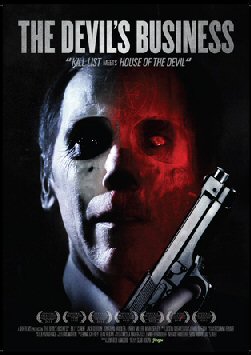
Seasoned hitman Pinner (Billy Clarke) and young protégé Cully (Jack Gordon) let themselves into their latest quarry’s home one evening, knowing that the object of their intention – Kist (Jonathan Hansler) - is out until 11pm at the opera.
They settle into his armchairs in the meantime, sitting in the dark so as not to alert his neighbours to their presence. It quickly transpires that Cully has an inquisitive conscience about his job – he wants to know why their boss, Bruno (Harry Miller), wants Kist dead. Pinner, on the other hand, insists that Cully doesn’t need to know: you shut up and do what you’re paid to do, basically.
Little happens for a while: the two fellows chat, share a few stories (one from Pinner in particular is an early, eerie highlight of the film) and remark upon Kist’s lacklustre housekeeping. Cully even attempts to tidy away a pig’s head that they find on a plate in the dining room; Pinner insists they touch nothing unnecessarily.
Then, about 20 minutes after their arrival, they hear a bang in Kist’s garage. Upon investigating, they find a lot of lit candles and a human skull on what seems to be an altar of some kind. A pentagram has been chalked into the floor, and a goat’s skull is placed in the centre of it. There’s no doubt in their minds: they appear to have uncovered, in Cully’s words, "devil-worshipping shit".
From there, the pair – especially Cully – grow more panicky. A telephone call to Bruno offers little reassurance, as he orders them to stay put and carry out their duties. Matters aren’t made any simpler when the cool, calm Kist turns up and a simple plan starts to go tits up …
The opening titles, a slow montage of Tarot-like images set to Justin Greaves’ mournful, almost Gregorian score, immediately evoke the horror cinema of the late 60s to mid-70s. There’s an ambience to this credits scene alone that suggests THE DEVIL’S BUSINESS is going to be straight-faced, old-school and free from the genre’s post-Millennial trend of self-irony that I detest so much.
In keeping with this promising start, the film rolls out as a talky yet engrossing, decidedly serious and dark character-driven foray into unpredictable territory. The type of film horror cinema is generally lacking in these days.
BUSINESS is written and directed by Sean Hogan. As with his last feature directorial effort, 2005’s under-seen LIE STILL, his strengths here are strong dialogue (frill-free banter, all of which serves to better inform us about characters in order for us to empathise with later events – is it perhaps a tad grandiose of me to describe this talent as Hitchcockian?) and a knack for mustering the best from his cast.
Speaking of whom, the actors in question are brilliant. It may take a few minutes to warm to them and their accents (Clarke is Irish; Gordon is Cockney), but they soon get under the skin and convince as they deliver quirks and foibles with energetic, seemingly effortless conviction. Hansler is successfully sinister without overplaying it, when he eventually arrives on screen.
The single location setting and diminutive cast requirements dictate that THE DEVIL’S BUSINESS does feel a little like a stage play that’s been adapted for the screen at times. But it’s credit to cinematographer Nicola Marsh, who imbues almost every interior shot with a noirish quality worthy of the Coen brothers’ BLOOD SIMPLE, that things remain cinematic at all times. It helps, of course, that performances are riveting, lighting is key and editing is taut.
And then there’s the aforementioned dialogue. If the still of the background sound design and brooding darkness of the photography have you psychologically prepared for some awful descent into Hell from the start (and they should), then at least Hogan is savvy enough to proffer a fine balance of authentically tentative banter between the two twitchy assassins. He even laces their guarded chat with some welcome humour, all of which comes naturally and works: a favourite line of mine was "If you were paid to think you’d struggle to make minimum wage".
Hoodwinking subjects such as physics and religion into his characters’ conversations doesn’t come awkwardly for Hogan. FX and action do though (possibly a budget thing); it’s good then that they’re kept to a bare minimum.
The slow-build is definitely a plus for this film though – it’s a short affair, incidentally, clocking in at only 69 minutes in length. It’s also talk-heavy and utterly dependent upon its three central characters. But don’t worry: it’s never boring. On the contrary, this is economic storytelling and filmmaking of a very high order.
So much so that, as satisfying and bloody as the denouement is, it’s almost a let-down when compared to the tense, plausible and yet arguably uneventful hour that precedes it.
Although a tad familiar at times – a corpse vanishes, not entirely unexpectedly; a comparison to KILL LIST is superficial at best but still there – there’s enough here to recommend THE DEVIL’S BUSINESS as a haunting, efficiently made horror thriller you’ll not soon forget.
As an interesting aside, the film lists horror film writer Jay Slater as one of its five executive producers.
THE DEVIL’S BUSINESS is due to enjoy a limited theatrical release in the UK, beginning on 17th of August 2012. As far as I know, there is no DVD release date set yet.
If THE DEVIL’S BUSINESS plays near you, you could do a lot worse than go to see it: support your local arthouse cinema, and see a very good film at the same time!
Review by Stuart Willis
| Released by Metrodome |
| Region 2 - PAL |
| Rated 18 |
| Extras : |
| see main review |